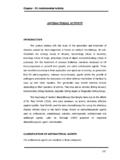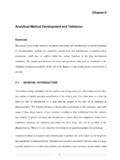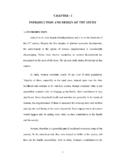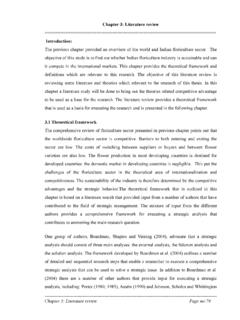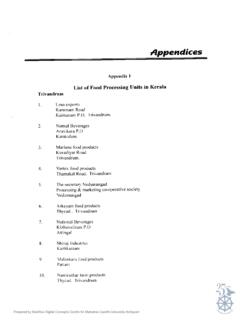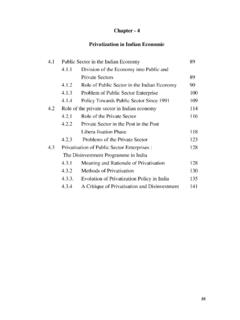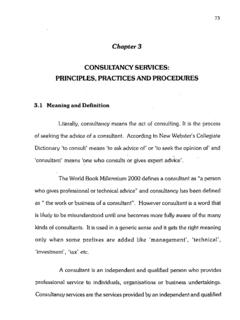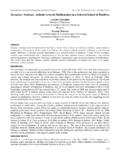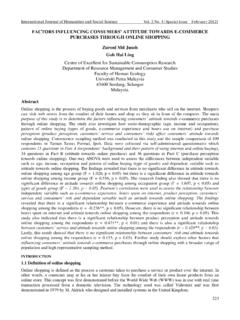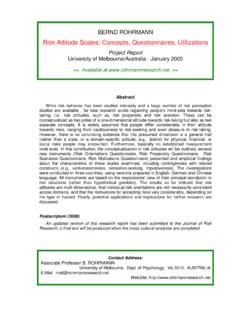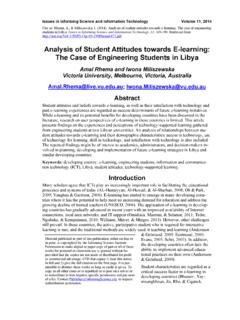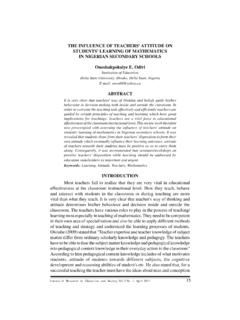Transcription of TEACHERS’ AND STUDENTS’ ATTITUDES TOWARDS …
1 114 CHAPTER 6 TEACHERS AND students ATTITUDES TOWARDS MATHEMATICS INTRODUCTION This chapter raises the issue of the relationships between students mathematics achievement and the ATTITUDES of both the student and the teacher toward mathematics. There is now a widespread recognition that affective factors play a critical role in teaching and learning of mathematics. (Mcleod 1992, 1994). A number of researchers have investigated the relationship between affective and cognitive domains. In general ATTITUDES , beliefs and emotions are the major descriptors of the affective domain in mathematics education. Traditionally mathematics education researchers have taken the relationship between attitude TOWARDS mathematics and achievement in mathematics as a major concern in their research work. Aiken (1970) referred to attitude as a learned predisposition or tendency on part of an individual to respond positively or negatively TOWARDS some object, situation, concept or another person.
2 Neal (1969) defined Attitude TOWARDS Mathematics as a tendency to engage in or avoid mathematical activities, a belief that one is good or bad in mathematics and a belief that mathematics is useful or useless. In both theory and practice a strong relationship between Attitude TOWARDS mathematics and Achievement in mathematics has been taken implicitly for a long time. Hazma Mukhtar (1952) demonstrated the relation of motivational and attitudinal factors to the problems of learning mathematics. Behr A N (1973) , Rajput( 1984), Singh (1986), found ATTITUDES to be related to mathematics achievement. Factors predominant among school failures studied by Jain (1979) were mathematical Generated by Foxit PDF Creator Foxit For evaluation background, attitude TOWARDS mathematics and low motivation. Tuli (1979) found aptitude for mathematics and achievement in mathematics were significantly and positively related to mathematical creativity.
3 students ' concerns about mathematics can significantly affect their ability to learn and understand the subject. Furthermore, their anxieties and ATTITUDES may greatly affect how they perceive their own mathematical competence (Hopko R. D. 1998). For instance, students may perceive mathematics as an incomprehensible set of abstract procedures and methods to follow, not being aware that there are reasons underlying these methods. Frustration due to the lack of in-depth understanding ma y discourage students from pursuing studies in mathematical sciences. Through observations and interviews with high school students as they were solving mathematical problems, Schoenfeld (1985) concluded that part of the problem-solving process is influenced by students ' beliefs about the nature of mathematical knowledge and learning. The affective factor of math anxiety is greatly related to mathematics achievement in the negative direction.
4 Gender is also considered as a basic factor which is largely related to both affective and cognitive math anxiety. Ho. H. Senturk et al (2000),Saha (2007) conducted a study on gender, attitude to mathematics, cognitive style and achievement in Mathematics. It was found that all the three contribute to statistically significant difference in achievement in mathematics. Thomas (2006) conducted a study to determine the Attitude TOWARDS Mathematics and achievement by combining co-operative learning strategies with instruction delivered using an Integrated Learning System (ILS). Teachers are the key to improving mathematics education. The preparation, certification, ongoing professional development and attitude of teachers define the outcome of their teaching experience on their students . Research into the Generated by Foxit PDF Creator Foxit For evaluation mathematical understandings of teachers indicate that even when teachers (both pre service and in-service) appear to be adequately prepared, their mathematical knowledge base is shallow and compartmentalized (Ball, 1990; Bloom, 2001; Bryan, 1999; Post, Tirosh D and Graeber, 1990).
5 A rich, well-connected knowledge base allows teachers to conduct the kind of inquiry and discourse that students need to develop to have a proper understanding of mathematics concepts. McSheffrey K,(1992).suggests that teachers' ability to connect math to real-life situations affects female students ' math experience. The influence of teachers' behaviors on students (teachers who made students feel important, cared for, ), the influence of parents (their support or lack of support), personal decisions regarding ATTITUDES TOWARDS math, and the ATTITUDES of boys toward girls were found to be factors affecting the achievement of school students in mathematics. Teachers' ATTITUDES are almost as important as those of students . Reports show that minority teachers may themselves express negative ATTITUDES about math, encouraging their students to pursue higher levels of education but not in math or science.
6 Majority teachers may tend to shield minority students from failure by holding lower expectations and not recommending higher-level math classes. (Cocking and Chipman 1989).Researchers have indicated that teacher attitude may affect student achievement.(Brophy and Good 1974,Cooper and Good 1983) Attitude TOWARDS mathematics among students does affect achievement in mathematics.(Aiken LR,1971). If school students have a strong belief that mathematics is not useful in their lives or future careers, they may resist spending time or effort needed to be successful at it .Several investigators have developed scales to measure attitude TOWARDS mathematics and also discovered a relation between attitude and achievement. Kolhe (1985) compared boys and girls and urban Generated by Foxit PDF Creator Foxit For evaluation and rural population on attitude TOWARDS mathematics and indicated significant differences between the ATTITUDES of urban and rural students TOWARDS mathematics irrespective of sex.
7 Mishra (1978) developed a scale to measure attitude TOWARDS mathematics and indicated a relationship of ATTITUDES with some socioeconomic factors. Children from better homes had a favorable attitude when compared to children from poor homes. K. K. Perkins, W. K. Adams and others (2005) found positive correlations between particular student beliefs and conceptual learning gains, and between student retention. They saw that students who come into a course with more favourable beliefs are more likely to achieve high learning gains Another area which has been studied is belief about future careers Pettitt, Lisa(1995)Accordingly it is seen that middle school students do not recognize the subjects that they must study in order to have specific careers. They tended to choose sex-stereotyped careers when filling out the survey. Girls felt that they would be capable of becoming doctors or veterinarians, but they did not want to have science-related careers as adults.
8 Boys stated the opposite. Neither the boys nor the girls recognized the relation between the study of math and science and their future career aspirations. Because this study indicates that girls may not realize that their preferred future careers can require course work in science and math, it seems prudent for math and science teachers to discuss with students the many professional fields that require math and science. The records of these studies highlights the significance of attitude toward mathematics and directs the attention of mathematics educators to the relationship between attitude and achievement in mathematics .It is seen that teachers personal beliefs and experiences effect how they teach, Thompson (1992) pointed out that there are numerous ways of interpreting the idea of a belief. Integrating the Generated by Foxit PDF Creator Foxit For evaluation frameworks for change, researchers Smith, , Williams, & Smith, (2005)
9 Provided the components of a model for analysis of the essential elements and processes of changing beliefs which included Teachers interests in change, the extents to which they problematize current practices and pose possible solutions, their activities in exploring and testing these alternative practices and their reflective analyses of the benefits of these changes for students , leading to lasting changes in beliefs and practices This study seeks to find the influence of teaching practices on student beliefs and their achievement in mathematics, the relationship between student beliefs about mathematics and their conceptual learning in the mathematics course, the relationship between students beliefs about mathematics and their decisions about whether to continue on in mathematics in their future studies. DATA ATTITUDES of students and teachers were collected by administering a mathematics attitude scale in a questionnaire prepared for the same purpose.
10 The attributes for students attitude TOWARDS mathematics consists of a set of 14 statements to which students respond using a five point Likert scale. The questions related to their self confidence in learning mathematics, the usefulness of mathematics, the importance of conceptual understanding in mathematics, the relation between effort and ability in mathematics, parents and teachers ATTITUDES TOWARDS their ability in mathematics,understanding of the classroom lecture, the perception of the students TOWARDS their teachers liking of the subject ,the importance of mathematics in their future career choices. Generated by Foxit PDF Creator Foxit For evaluation The questions were worded both in the positive and negative sense ranging from strongly agree to strongly disagree . For the positive sense questions a value of 5 was assigned to strongly agree ,decreasing values of 4,3,2,1 were given to the other questions, where strongly disagree was assigned the value 1.
